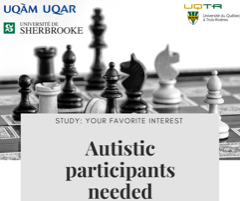Passion and Optimal Functioning in Autism
This study aims to better understand the role of passions in adolescents and young adults with autism aged 14 to 30.
One of the diagnostic criteria for autism is the presence of interests whose intensity or purpose are atypical. These are sometimes perceived by parents and caregivers as negative and are a target of behavioral intervention. However, their consequences are still poorly understood, and little reported by autistic people themselves. According to the dualistic theory of passion (Vallerand), an activity can be associated with positive and negative consequences, depending on the type of passion associated (obsessive or harmonious). This conceptual framework has never been applied to an autistic population, in which restricted interests can resemble passions.
This project aims to better understand the association between the passion of autistic people for their favorite activity and its consequences on optimal functioning. A study of online questionnaires is with autistic young adults between 14 and 30 years old.
This research has the potential to provide important nuance regarding the adaptive role of interests, as perceived by autistic individuals. It could contribute to the recognition of the lever of intervention and social integration that these interests can represent for these people.
For more information, you can contact Alexa Meilleur at the following address: Meilleur.alexa@courrier.uqam.ca
Principal Investigator: Eve-Line Bussières, Ph.D.
Collaborators: Isabelle Soulières, Robert Vallerand, Mélanie Couture, Elsa Gilbert and Noemie Cusson
Student: Alexa Meilleur
Funding: SSHRC Knowledge Development to the Principal Investigator, and SSHRC Doctoral Fellowship to Alexa Meilleur




